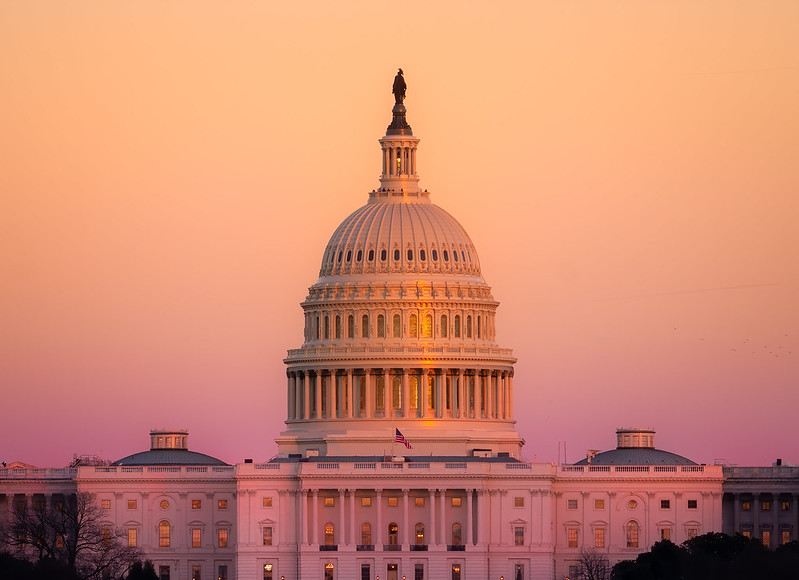
The House of Representatives will this week vote on the “bloatedbus” appropriations bills, H.R. 4502, which provides appropriations for 7 of the 12 agencies covered by the annual appropriation acts: Labor/HHS/Education, Agriculture, Energy/Water, Financial Services, Interior/Environment, Military Construction/VA, and Transportation/HUD.
This bill is packed full of wasteful spending and should be rejected by members of Congress.
The bill promises “thousands” of new jobs through lavish spending on “clean energy,” provides funding to the corrupt and dysfunctional IRS, creates a Civilian Climate Corp, expands federal involvement in housing, and includes millions of dollars’ worth of earmarks.
Ideally, each appropriation for an agency would be a separate bill, allowing for more scrutiny and helping ensure lawmakers’ ability to know exactly what they’re voting on. Instead, funding for agencies is often grouped together, creating “must-pass” legislation with unexplored, wasteful spending.
Within this high-price bill are pieces of the leftist agenda that, perhaps, are too unpopular to pass through higher profile legislation.
Below are just a few wasteful, harmful parts of this appropriations package.
This bill would spend exorbitantly on projects to combat climate change, with a false promise of “thousands of jobs.”
H.R. 4502 would spend billions of dollars on “creating good-paying American jobs through investments in renewable energy.”
Investments and subsidies for “clean energy” are not new. In fact, for over 30 years the government has been holding these industries afloat, shielding them from the reality of the marketplace. This, ultimately, could actually be a reason why the alternative energy industry still has not been able to be competitive with fossil fuels. This industry is dependent on the government, and therefore is comfortable with slow, costly “progress.” Meanwhile, taxpayers foot the bill.
Further, the promise of American jobs through renewable energy has also fallen flat. Many of the “clean energy” job number estimates are inflated to include “jobs tied to energy efficiency,” like “positions in the heating, ventilation and air conditioning industry, as well as fields like advanced building materials and efficient lighting.” This ridiculous category makes up 77 percent of “clean energy jobs” in the “Clean Energy Trust and Environmental Entrepreneurs” estimate.
In general, Americans should be skeptical of any claim that the government can create jobs.
If President Biden were really concerned with high-paying manufacturing jobs, he’d be less bent on destroying jobs in the oil and gas industry, which employs millions of Americans and pays a salary 85 percent higher than the average private sector salary.
This bill would increase funding for the IRS.
The IRS has a long history of dysfunction, corruption, and lackluster privacy protection. Before funneling money into a broke agency, Congress should reform the IRS.
Specifically, the bill includes $13.6 billion for the IRS, an increase of $1.7 billion above the FY 2021 enacted level. About $5.8 billion of this funding will go towards enforcement, ultimately fueling the IRS to unleash its wrath on the American people.
Contrary to Democrats’ claims, new IRS enforcement will fall on American families and small businesses, not the “rich.” The wealthy and large corporations already have armies of lawyers and accountants that ensure they legally take advantage of the plethora of credits and deductions offered by the tax code. In this way, the IRS will revert back to collecting money from easier targets: small businesses and middle-class families.
The bill creates a Civilian Climate Corps.
The creation of a uniformed Civilian Climate Corps is a make-work program for progressive climate activists who will be tasked with the vague mission of “advancing environmental justice.”
According to an Appropriations Committee report on the environmental funding sections of the bill, “The Departments of Interior and Agriculture are directed to provide a written plan, within 90 days of enactment of this Act, for how CCC funding will be used, along with a breakdown of funding and a list of existing programs or partners.”
Though the minibus is scant on details, progressive proposals for the CCC offer a glimpse of the waste that is likely to occur. The 21st Century Civilian Conservation Corps Act introduced by House Democrats calls for at least 80 percent of CCC funding to be used for employment, leaving less than 20 percent to be used for actual conservation and climate-related efforts. Additionally, Democrats want CCC employees to receive taxpayer-funding housing, clothing, food, and transportation—all in addition to their actual salaries.
This bill significantly expands the federal government’s involvement in affordable and public housing.
Instead of deregulating and empowering the housing market to drive down costs, this bill seeks to distort housing markets through more spending on “affordable” and public housing.
Specifically, this bill includes funding for more than 125,000 new housing vouchers and the creation of 4,000 new housing units. The bill would also fund public housing by $8.64 billion.
This “Housing First” approach by Democrats fundamentally ignores many of the causes of high housing prices and could contribute to the problem itself. In fact, regulations, zoning policy, and market distortions are some of the driving factors in higher rent prices.
This bill contains hundreds of millions of dollars in earmarks.
Earmarks are provisions inserted by members of Congress into large spending bills directing funds to be spent on specific projects or programs. Before their ban, funds would often be directed towards specific congressional districts, pressuring members into voting for legislation they wouldn’t normally vote for. Congressional Democrats recently brought earmarks back, restoring this currency of corruption.
This practice facilitates the passage of unpopular, costly legislation filled with giveaways to lawmakers. It pushes members of Congress to vote not on the merits of the legislation, but because a small portion of the legislation would benefit their home district, a donor of theirs, or even themselves.
This spending package contains a lot of these earmarks, especially for colleges and universities. Specifically, $272 million in funding would go towards pet projects at 228 colleges and universities.
Lawmakers should reject this “bloatedbus” and instead demand responsible and reasonable federal spending.

